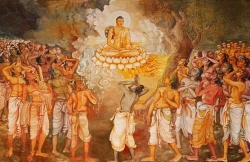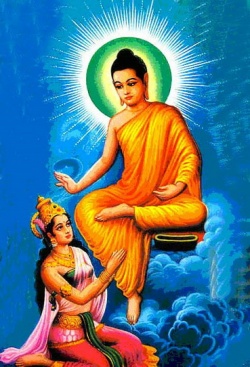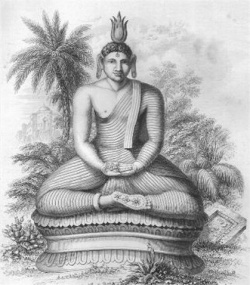Saleyyaka Sutta
Sāleyyaka Sutta
The inhabitants of Sālā ask the Buddha why some are born after death in places of woe and others in places of joy.
The Buddha explains that it is due to their deeds, good or bad.
Introduction
by Bhikkhu Khantipalo
The brahmans of this discourse, intelligent people, asked a question about the causality of rebirth — why is one reborn in the states of deprivation (the hells, animals, and ghosts) while others make it to the heaven worlds?
The Buddha then analyzes what kind of kamma will take one to a low rebirth. You see any of your own actions here? Then you know what to do about it, for if one makes any of these ten courses of unwholesome kamma strong in oneself, a result can be expected at least "on the dissolution of the body, after death," if not in this life.
The ten courses of wholesome kamma follow. They should be strengthened in oneself, repeated frequently so that they become habitual. If one recognizes any of one's own actions among them, then just guard against the conceit: "I am good."
The last part of the sutta deals with the aspirations which one may have for rebirth at the time of death. Of course, one's previously made kamma must be such that it will support such aspirations. A miser might aspire to riches but his kamma will give him poverty. If a person has kept the Uposatha and generally all the precepts and been generous and truthful as well, this is the passport to heavenly birth (from the gods of the Four Kings up to the gods that Wield Power over others' Creations). Beyond this, it is necessary also to be proficient in jhana and one will gain rebirth among the Brahmas (from the Divinity's Retinue to the Very Fruitful gods) according to proficiency in this. For the next five Brahma-planes, the state of non-returning is required, while for the last four one must have gained the formless attainments. Finally, one may aspire to no rebirth: to arahantship, but of course the aspiration alone is not sufficient — practice and sufficient insight-wisdom are needed.
1. Thus have I heard. On one occasion the Blessed One was wandering in the Kosalan country with a large Sangha of bhikkhus, and eventually he arrived at a Kosalan brahman village called Sala.
2. The brahman householders of Sala heard: "A monk called Gotama, it seems, a son of the Sakyans who went forth from a Sakyan clan, has been wandering in the Kosalan country with a large Sangha of bhikkhus and has come to Sala. Now a good report of Master Gotama has been spread to this effect: 'That Blessed One is such since he is arahant and Fully Enlightened, perfect in true knowledge and conduct, sublime, knower of worlds, incomparable teacher of men to be tamed, teacher of gods and humans, enlightened, blessed. He describes this world with its gods, its Maras, and its (Brahma) Divinities, this generation with its monks and brahmans, with its kings and its people, which he has himself realized through direct knowledge. He teaches a Dhamma that is good in the beginning, good in the middle and good in the end with (the right) meaning and phrasing, he affirms a holy life that is utterly perfect and pure.' Now it is good to see such arahants."
3. The brahman householders of Sala went to the Blessed One; and some paid homage to the Blessed One and sat down at one side; some exchanged greetings with him, and when the courteous and amiable talk was finished, sat down at one side; some raised hands palms together in salutation to the Blessed One and sat down at one side; some pronounced their name and clan in the Blessed One's presence and sat down at one side; some kept silence and sat down at one side.
4. When they were seated, they said to the Blessed One: "Master Gotama, what is the reason, what is the condition, why some beings here, on the dissolution of the body, after death, reappear in states of deprivation, in an unhappy destination, in perdition, even in hell; and what is the reason, what is the condition, why some beings here, on the dissolution of the body, after death, reappear in a happy destination, even in the heavenly world?"
5. "Householders, it is by reason of conduct not in accordance with the Dhamma, by reason of unrighteous conduct, that beings here on the dissolution of the body, after death, reappear in states of deprivation, in an unhappy destination, in perdition, even in hell. It is by reason of conduct in accordance with the Dhamma, by reason of righteous conduct, that some beings here on the dissolution of the body, after death, reappear in a happy destination, even in the heavenly world."
6. "We do not understand the detailed meaning of this utterance of Master Gotama's spoken in brief without expounding the detailed meaning. It would be good if Master Gotama taught us the Dhamma so that we might understand the detailed meaning of Master Gotama's utterance spoken in brief without expounding the detailed meaning."
"Then, householders, listen and heed well what I shall say."
"Yes, venerable sir," they replied. The Blessed One said this:
7. "Householders, there are three kinds of bodily conduct not in accordance with the Dhamma, unrighteous conduct. There are four kinds of verbal conduct not in accordance with the Dhamma, unrighteous conduct. There are three kinds of mental conduct not in accordance with the Dhamma, unrighteous conduct.
8. "And how are there three kinds of bodily conduct not in accordance with the Dhamma, unrighteous conduct? Here someone is a killer of living beings: he is murderous, bloody-handed, given to blows and violence, and merciless to all living beings. He is a taker of what is not given: he takes as a thief another's chattels and property in the village or in the forest. He is given over to misconduct in sexual desires: he has intercourse with such (women) as are protected by the mother, father, (mother and father), brother, sister, relatives, as have a husband, as entail a penalty, and also with those that are garlanded in token of betrothal. That is how there are three kinds of bodily conduct not in accordance with the Dhamma, unrighteous conduct.
9. "And how are there four kinds of verbal conduct not in accordance with the Dhamma, unrighteous conduct? Here someone speaks falsehood: when summoned to a court or to a meeting, or to his relatives' presence, or to his guild, or to the royal family's presence, and questioned as a witness thus, 'So, good man, tell what you know,' then, not knowing, he says 'I know,' or knowing, he says 'I do not know,' not seeing, he says 'I see,' or seeing, he says 'I do not see'; in full awareness he speaks falsehood for his own ends or for another's ends or for some trifling worldly end. He speaks maliciously: he is a repeater elsewhere of what is heard here for the purpose of causing division from these, or he is a repeater to these of what is heard elsewhere for the purpose of causing division from those, and he is thus a divider of the united, a creator of divisions, who enjoys discord, rejoices in discord, delights in discord, he is a speaker of words that create discord. He speaks harshly: he utters such words as are rough, hard, hurtful to others, censorious of others, bordering on anger and unconducive to concentration. He is a gossip: as one who tells that which is unseasonable, that which is not fact, that which is not good, that which is not the Dhamma, that which is not the Discipline, and he speaks out of season speech not worth recording, which is unreasoned, indefinite, and unconnected with good. That is how there are four kinds of verbal conduct not in accordance with the Dhamma, unrighteous conduct.
10. "And how are there three kinds of mental conduct not in accordance with the Dhamma, unrighteous conduct? Here someone is covetous: he is a coveter of another's chattels and property thus: 'Oh, that what is another's were mine!' Or he has a mind of ill-will, with the intention of a mind affected by hate thus: 'May these beings be slain and slaughtered, may they be cut off, perish, or be annihilated!' Or he has wrong view, distorted vision, thus: 'There is nothing given, nothing offered, nothing sacrificed, no fruit and ripening of good and bad kammas, no this world, no other world, no mother, no father, no spontaneously (born) beings,[1] no good and virtuous monks and brahmans that have themselves realized by direct knowledge and declare this world and the other world.'[2] That is how there are three kinds of mental conduct not in accordance with the Dhamma, unrighteous conduct.
"So, householders, it is by reason of conduct not in accordance with the Dhamma, by reason of unrighteous conduct, that some beings here, on the dissolution of the body, after death, reappear in states of deprivation, in an unhappy destination, in perdition, even in hell.
11. "Householders, there are three kinds of bodily conduct in accordance with the Dhamma, righteous conduct. There are four kinds of verbal conduct in accordance with the Dhamma, righteous conduct. There are three kinds of mental conduct in accordance with the Dhamma, righteous conduct.
12. "And how are there three kinds of bodily conduct in accordance with the Dhamma, righteous conduct? Here someone, abandoning the killing of living beings, becomes one who abstains from killing living beings; with rod and weapon laid aside, gentle and kindly, he abides compassionate to all living beings. Abandoning the taking of what is not given, he becomes one who abstains from taking what is not given; he does not take as a thief another's chattels and property in the village or in the forest. Abandoning misconduct in sexual desires, he becomes one who abstains from misconduct in sexual desires: he does not have intercourse with such women as are protected by mother, father, (father and mother), brother, sister, relatives, as have a husband, as entail a penalty, and also those that are garlanded in token of betrothal. That is how there are three kinds of bodily conduct in accordance with the Dhamma, righteous conduct.
13. "And how are there four of verbal conduct in accordance with the Dhamma, righteous conduct? Here someone, abandoning false speech, becomes one who abstains from false speech: when summoned to a court or to a meeting or to his relatives' presence or to his guild or to the royal family's presence, and questioned as a witness thus, 'So, good man, tell what you know,' not knowing, he says 'I do not know,' or knowing, he says 'I know,' not seeing he says 'I do not see,' or seeing, he says 'I see'; he does not in full awareness speak falsehood for his own ends or for another's ends or for some trifling worldly end. Abandoning malicious speech, he becomes one who abstains from malicious speech: as one who is neither a repeater elsewhere of what is heard here for the purpose of causing division from these, nor a repeater to these of what is heard elsewhere for the purpose of causing division from those, who is thus a reuniter of the divided, a promoter of friendships, enjoying concord, rejoicing in concord, delighting in concord, he becomes a speaker of words that promote concord. Abandoning harsh speech, he becomes one who abstains from harsh speech: he becomes a speaker of such words as are innocent, pleasing to the ear and lovable, as go to the heart, are civil, desired of many and dear to many. Abandoning gossip, he becomes one who abstains from gossip: as one who tells that which is seasonable, that which is factual, that which is good, that which is the Dhamma, that which is the Discipline, he speaks in season speech worth recording, which is reasoned, definite and connected with good. That is how there are four kinds of verbal conduct in accordance with the Dhamma, righteous conduct.
14. "And how are there three kinds of mental conduct in accordance with the Dhamma, righteous conduct? Here someone is not covetous: he is not a coveter of another's chattels and property thus: 'Oh, that what is another's were mine!' He has no mind of ill-will, with the intention of a mind unaffected by hate thus: 'May these beings be free from enmity, affliction and anxiety, may they live happily!' He has right view, undistorted vision, thus: 'There is what is given and what is offered and what is sacrificed, and there is fruit and ripening of good and bad kammas, and there is this world and the other world and mother and father and spontaneously (born) beings, and good and virtuous monks and brahmans that have themselves realized by direct knowledge and declared this world and the other world.' That is how there are three kinds of mental conduct in accordance with the Dhamma, righteous conduct.
"So, householders, it is by reason of conduct in accordance with the Dhamma, by reason of righteous conduct, that some beings here, on the dissolution of the body, after death, reappear in a happy destination, even in the heavenly world.
15. "If a householder who observes conduct in accordance with the Dhamma, righteous conduct, should wish: 'Oh, that on the dissolution of the body, after death, I might reappear in the company of the warrior-nobles of great property!' it is possible that on the dissolution of the body, after death, he may do so. Why is that? Because he observes conduct that is in accordance with the Dhamma, righteous conduct.
16. "If a householder who observes conduct is accordance with the Dhamma, righteous conduct, should wish: 'Oh, that on the dissolution of the body, after death, I might reappear in the company of the brahmans of great property!' it is possible...
17. "If a householder who observes conduct in accordance with the Dhamma,...'... I might reappear in the company of householders of great property!' it is possible...
18. "If a householder who observes conduct in accordance with the Dhamma, righteous conduct, should wish: 'Oh, that on the dissolution of the body, after death, I might reappear in the company of the gods of the Four Kings!' it is possible that on the dissolution of the body, after death, he may do so. Why is that? Because he observes conduct in accordance with the Dhamma, righteous conduct.
19. ...of the gods of the Realm of the Thirty-three...[3]
20. ...of the gods that have Gone to Bliss...
21. ...of the Contented gods...
22. ...of the gods that Delight in Creating...
23. ...of the gods that Wield Power over others' Creations...
24. ...of the gods of Brahma's Retinue...
25. ...of the Radiant gods...
26. ...of the gods of Limited Radiance...
27. ...of the gods of Measureless Radiance...
28. ...of the gods of Streaming Radiance...
29. ...of the Glorious gods...
30. ...of the gods of Limited Glory...
31. ...of the gods of Measureless Glory...
32. ...of the gods of Refulgent Glory...
33. ...of the Very Fruitful gods...
34. ...of the gods Bathed in their own Prosperity...
35. ...of the Untormenting gods...
36. ...of the Fair-to-see gods...
37. ...of the Fair-seeing gods...
38. ...of the gods who are Junior to None...
39. ...of the gods of the base consisting of the infinity of space...
40. ...of the gods of the base consisting of the infinity of consciousness...
41. ...of the gods of the base consisting of nothingness...
42. "If a householder who observes conduct in accordance with the Dhamma, righteous conduct, should wish: 'Oh, that on the dissolution of the body, after death, I might reappear in the company of the gods of the base consisting of neither-perception-nor-non-perception!' it is possible that, on the dissolution of the body, after death, he may do so. Why is that? Because he observes conduct in accordance with the Dhamma, righteous conduct.
43. "If a householder who observes conduct in accordance with the Dhamma, righteous conduct, should wish: 'Oh, that by realization myself with direct knowledge, I may here and now enter upon and abide in the deliverance of the heart and the deliverance by wisdom that are taint-free with exhaustion of taints!' it is possible that, by realization himself with direct knowledge, he may here and now enter upon and abide in the deliverance of the heart and the deliverance by wisdom that are taint-free with exhaustion of taints. Why is that? Because he observes conduct in accordance with the Dhamma, righteous conduct."
44. When this was said, the brahman householders of Sala said to the Blessed One:
"Magnificent, Master Gotama! Magnificent, Master Gotama! The Dhamma has been made clear in many ways by Master Gotama, as though he were turning upright what had been overthrown, revealing the hidden, showing the way to one who was lost, holding up a lamp in the darkness for those with eyes to see forms.
45. "We go to Master Gotama for refuge, and to the Dhamma, and to the Sangha of bhikkhus. From today let Master Gotama accept us as followers who have gone to him for refuge for life."
Notes
1.
Beings who appear due to the force of past action (kamma) in some states of birth: all gods and divinities, ghosts, inhabitants of hells; see Majjhima Nikaya Sutta 12 (Maha-sihanada Sutta).
2.
For an explanation of these views held by some teachers in the Buddhist time, and which were a rejection of all moral values, see Ledi Sayadaw, The Eightfold Path and its Factors Explained (BPS Wheel No. 245/247).
3.
The rendering of the various gods' names are based on the commentary to the Hadayavibhanga (in the Vibhanga, second book of the Abhidhamma: see The Book of Analysis, P.T.S. Translation Series).









